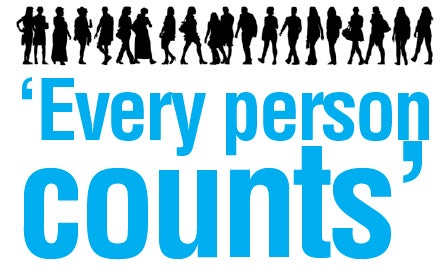CLoser Look: Governments gearing up for 2020 Census
Published 12:41 pm Monday, August 26, 2019
Once every decade, the federal government conducts a count of everyone living within the United States.
In the short term, it means thousands of government jobs open across the nation as they seek to take the most accurate count possible.
The impact of that count is far reaching. It affects how districts are drawn for governmental bodies from Congress and state legislatures down to the local school boards, fiscal courts and city governments. It is a factor in how federal funds are distributed, more than $675 billion, according to the census organization.
Population numbers and other census data are considered by businesses as they plan to expand or open new facilities.
It’s a massive undertaking, and it’s less than a year away.
What is the census?
Taking a regular census was included in the U.S. Constitution and has been performed every decade since 1790.
Originally, the census was conducted by marshals within the federal judicial districts. The first asked six things: gender, race, relationship to the head of the household, name of the head of household and the number of slaves, if any were owned.
That first census surveyed the 13 original states plus districts of Kentucky, Maine, Vermont and the Southwest Territory, which is present day Tennessee.
The 2020 census will include 10 questions including the respondent’s age, race, hispanic origin, relationship to the head of household, gender, whether they own or rent the property and whether the person is a U.S. citizen.
Title 13 of the U.S. Code regulates the census, and states census officials must notify the members of Congress of the general subjects of questions three years ahead of the census, and the actual questions two years ahead of the census.
How will it be conducted
Leslie Rodgers, a U.S. Census partnership specialist based in Lexington, told the Winchester Board of Commissioners recently the 2020 census will be conducted primarily online.
There will still be four mailings and some people going door to door to physically count people, but online will be the easiest and best way, she said.
Residents will also have the option to answer the questions over the phone or mail their responses in.
“If by the end of April you choose not to fill it out, that’s when people start going door to door,” she said.
The first of four mailings will be sent between March 12 and March 20, 2020, which will include a code to use online, she said.
Subsequent mailings include a reminder letter around March 16-24. Those who do not respond will receive a reminder postcard around March 26 and April 3, a letter and paper questionnaire around April 8-16, and a final card around April 20-27.
After that, census workers will begin going door to door.
Some extremely rural areas, including Alaska, northern Maine and some American Indian areas, will only be counted in person, according to the Census Bureau.
Rodgers said personal information is kept confidential for 72 years.
General information, though, will be gathered and published as part of the annual census data which can be used publicly for a number of uses.
Local help needed
In the meantime, census officials are looking for local partners to help spread the word about the census throughout the county and its population groups.
“Every city and county is its own private culture,” Rodgers said. “What we rely on is state and local officials for Complete Count Committees.”
The committees, she said, can be any size and can be focused on specific parts of the population with in a community. The committee members would then strategize how to spread the word about the census.
“Then you have the opportunity to strategize for yourself,” Rodgers said. “There are a number of hard-to-count groups: rural areas, non-English speakers, children younger than 5.”
“We want as many CCCs as possible. That means we’re getting the word to as many as possible.”
Rodgers said Lexington has a CCC specifically for the Congolese community.
Rodgers said the census is already hiring employees for a variety of positions. Minimum pay is $14 an hour and 58 cents a mile, she said, though pay will vary slightly from county to county.
Schedules can be full time, part time or flexible, and employees can carry over from one phase of the census to the next, she said.
Employees must be 18, a U.S. citizen and be able to pass a background check. The background check is the most time consuming part of the process.
Effects of an accurate count
The Census Bureau said its goal is to count “every person living in the U.S. once, only once, and in the right place.” That count is to include children, citizens and non-citizens as well as those in the country illegally.
U.S. law prevents census officials from sharing information gathered in the Census with other governmental agencies.
Participation in the census is mandatory, and fines, though rare, could be imposed for giving false answers or refusing to answer.
Census data is key to drawing district boundaries, which shift based on population from census to census. A report in the New York Times indicated Texas, Florida, Colorado and Oregon could gain seats in Congress while Illinois, Ohio, New York and West Virginia may lose seats.
Funding for a number of federal programs, including Head Start, Medicaid, Pell college grants and SNAP could also be affected, as could federal highway spending.
Census Day
Rodgers said the key day is April 1, 2020, or Census Day.
The questionnaire will ask who is living in the residence on that day, aside from those on vacation or business trips.
“That’s how you count them,” Rodgers said. “It helps us place them. We don’t care how they got there. We care where they are. We really just want statistics.”







